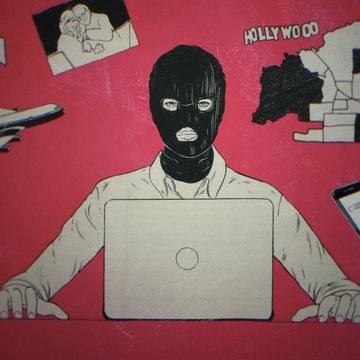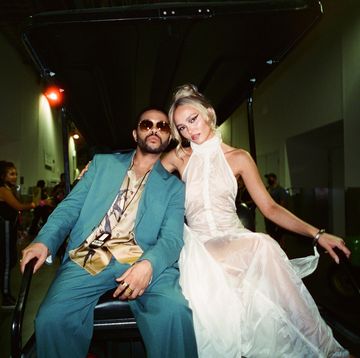While The Crown’s fifth season has debuted to decidedly mixed reviews – the retread of the royal family’s ‘90s woes is, by and large, a drab affair – there are still some excellent moments to be found, recalling the heady days of earlier seasons. Elizabeth Debicki brings Diana to life, neither saint nor monster but an actual human, who understands she is both trapped and can command attention to her cause. The supporting cast, especially Lesley Manville as Princess Margaret, are as strong as ever. And perhaps the best part of the new season comes in the later episodes, when the show tackles the 1995 interview between Martin Bashir and Princess Diana.
Prasanna Puwanarajah takes on the role of the BBC journalist. The doctor turned actor, who starred in Patrick Melrose and recently directed his first film, Ballywalter, likens joining The Crown as entering “a new planetary system”. “It was a completely different world and scale,” he says, “it’s almost its own institution.” Remarkably, Puwanarajah has played Bashir before, in the 2013 biopic Diana (in which Naomi Watts played the Princess of Wales). But though they filmed parts of the interview, a lot of the footage didn’t make it into the final film.
That was a blessing in disguise (and the film itself sunk without much trace) because taking on Bashir again didn’t feel like covering old ground, Puwanarajah says. Good thing, as The Crown spends a lot of time with Bashir, dedicating two episodes to the interview; the first in setting it up, and the second on its filming and broadcast. Puwanarajah reached out to Bashir when he played him in Diana, but didn’t hear back. This time, the actor didn’t make contact. In the time between the two performances, a lot has changed for Bashir.
Bashir’s Panorama interview with Diana, in which the princess went into depth about her “crowded” relationship with Prince Charles, was originally hailed as the scoop of a generation. In 2020, in time for the interview’s 25th anniversary, a slew of documentaries alleged that Bashir had used deceptive measures to secure the interview, which included forging bank documents to convince Diana and her brother, Earl Spencer, that they were being spied on by senior court figures. An independent inquiry followed, confirming that Bashir’s behaviour fell short of journalistic standards; Bashir left the BBC in 2021.
The facts of the interview are now common knowledge, but there are still lingering ambiguities. While Bashir deceived Diana, the princess certainly benefitted from the public support from its fall-out. On the other hand, as Prince William has pointed out, the deceptive tactics may also have stoked the princess’s paranoia, and Prince Harry has directly linked the interview’s after-effects with his mother’s death a year later. As with many storylines in The Crown, there has been controversy over depicting the interview (the BBC has agreed to never broadcast it again). For Puwanarajah, it was a chance to understand these figures more deeply: “I think it's important that the show depicts why that journey happened, and what may have been the points of connection between [Diana and Bashir].” He adds, “This is a dramatisation, you go away from Dyson, and the original Hall report, and into a space of trying to extend the empathetic understanding around conversations and relationships that didn't happen in the public domain.”
The first episode in which Bashir enters the scene plays out like a classic journalistic thriller, in the mould of Spotlight, only here it’s the journalists doing wrong. Bashir’s ambition to secure a scoop is palpable, especially after covering important (but not exactly attention-grabbing) topics like post-natal depression. Puwanarajah was interested in how the BBC environment might have affected Bashir, an Asian man who attended a comprehensive school. “The adaptations that people from minority ethnic backgrounds undergo, possibly even subconsciously, to survive in those spaces, and the additional kind of work that is needed to progress at an equivalent speed,” as he puts it. For many, that won’t excuse his actions towards the late princess, though Puwanarajah is not overly interested in any moral judgment: “The minute you’ve got an opinion as an actor, you’re sunk.”
The second episode contrasts the Bashir interview with Prince William learning about Guy Fawkes at Eton (the Panaroma episode was broadcast on 5 November), making a not exactly subtle statement about treason (and underlining it twice). Puwanarajah can’t recall where he watched the interview, but it left an impact. “I remember the feeling of closeness to Diana,” he says. Public figures, especially royals, had previously appeared at a distance; seeing a princess talk about the breakdown of her marriage and depression was extraordinary (though as The Crown makes clear, Prince Charles had admitted to adultery a year earlier in an interview with Jonathan Dimbleby).
As for getting into the mindset of Bashir, Puwanarajah worked with movement coach Polly Bennett, who has guided The Crown cast since Season 2. The outfits, unmistakably ‘90s, loose-fitting suits, helped. The set design was also transportive. The Panorama offices were actually a set in Basingstoke, and the art department had taken over an entire floor. “You could walk into an office and look in a drawer, and there would be stacks of VHS tapes from the ‘80s,” he says (those tapes have a very specific smell). Playing Bashir as an investigative journalist was a diverting detour for Puwanarajah: “Mine is not a career of spies meeting in car parks, or knocking around open plan offices doing journalism.”
In The Crown, Bashir tries to form connections with Diana over their outsider status; him as an Asian journalist at the establishment BBC, her as the black sheep of the royal family. It’s another slippery moment; while Bashir has a point, he also has an obvious ulterior motive. That level of complexity certainly makes a difference from playing “the brown guy”, he explains, so often side-lined to stereotypes or “the guy in the staff room who’s mates with the male, white lead”. “The level of detailing around minority storytelling that is incredibly rare,” Puwanarajah says. “I don’t really tend to see it.”
‘The Crown’ Season 5 is now streaming on Netflix
Henry Wong is a senior culture writer at Esquire, working across digital and print. He covers film, television, books, and art for the magazine, and also writes profiles.















